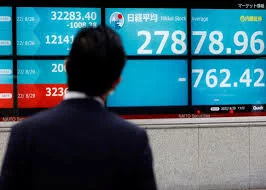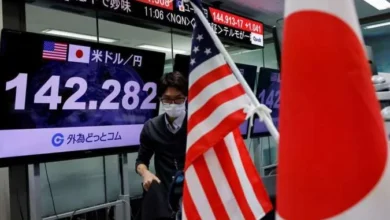Asia shares steady after solid China trade data, yen stable

Thursday saw a steadying of Asian equities as positive statistics from China’s trade indicated that the world’s second-largest economy’s domestic demand is increasing. Meanwhile, the yen stabilized following three days of falls as Japan discussed possible currency measures.
The Bank of England (BoE) is going to deliberate on interest rate policy later in the day. Following Sweden’s Riksbank’s overnight rate decrease, which highlighted Europe’s divergence from the Federal Reserve in the US, all eyes will be on the possibility of a June rate cut.
Table of Contents
The broadest MSCI Asia-Pacific index of stocks outside of Japan increased by 0.1%, closing in on a 15-month high touched earlier in the week following Fed Chair Jerome Powell’s reaffirmation of his support for policy reduction later in the year.
After three consecutive prints of positive surprises, investors will be watching the United States household inflation data for April, which is coming on Wednesday, in order to get a clearer idea of the Fed’s policy trajectory.
According to Chinese customs statistics, exports increased as predicted in April, while imports rose 8.4% from the same month last year, above estimates of a 4.8% increase.
As a result, Chinese equities were able to consolidate their previous gains, with Hong Kong’s Hang Seng index jumping 1.2% and bluechip companies rising 1%. Tokyo’s Nikkei gained 0.5%.
Nasdaq stock futures down by 0.1%, led by Uber’s 5.7% overnight decline after the ride-sharing business released a negative outlook following an unexpected quarterly loss.
“Despite the Riksbank’s initial rate cut, the positive sentiment has not improved. ING analysts noted in a client letter, “All eyes are now on the Bank of England.”
The markets will be closely watching for the Fed to take a similar posture, given Powell’s dovish attitude from only last week. This implies that if the BoE meeting does not show a comparable shift towards dovishness, the markets could be taken by surprise.
The Japanese yen fell for three sessions before levelling out at 155.55 per dollar. It increased by more than three percent last week following maybe two market interventions by Japanese regulators to halt the market’s sharp falls.

With markets on edge, senior currency diplomat Masato Kanda stated on Thursday that there is no limit to reserves in currency intervention. Meanwhile, minutes from the Bank of Japan’s April meeting revealed policymakers had become overwhelmingly hawkish, supporting the stability of the yen.
But in March, real earnings in Japan decreased by 2.5% from the previous year, the first dip in two years, which is reason enough for officials to refrain from raising wages too quickly.
Rates on the Treasury market hardly moved after ticking higher the previous day; these fluctuations are probably going to be limited in advance of the United States inflation data that comes out next week.
Overnight, the 10-year yield increased by 3 basis points to 4.5003%, while the two-year yield remained at 4.8470%. Thursday saw an increase in oil prices after they had recovered from two-month lows the day before.
While US oil climbed 0.5% to $79.40 per barrel, Brent futures increased by 0.4% to $83.91.

People also Reading
Asia shares jump on Fed cuts bets; yen pares gains.
Asia shares soar as the Fed looms large; the yen falls below a critical threshold.
Tech stocks suffer, yen teeters near intervention zone.
Will the Price of Bitcoin Increase Again?
Why the Bank of Japan (BOJ) cancels radical policies.
What is next move of Bitcoin? Boom Or bust?
Bitcoin surges past $64,000, setting new records.
HSBC’s $3 billion write-down in China eclipses record annual profit.
NY AG broadens crypto litigation, identifies $3 billion in fraud.
Analysis: US Bitcoin ETFs raise concerns about broader financial system risks.
The IMF predicts that AI will worsen inequality and affect nearly 40% of jobs worldwide.
S&P 500 gains 1% to reach an all-time high, breaking the 2022 record: real-time updates.




